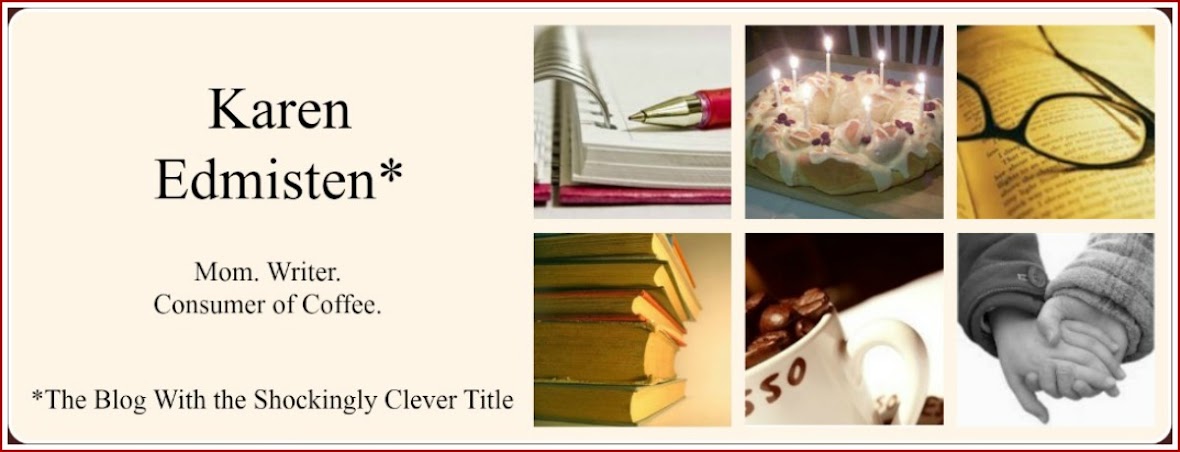 We had a priest friend over for dinner the other night, and I was talking about Fahrenheit 451, by Ray Bradbury. I was summing up the ways in which the book seemed prophetic: the electronic entertainment, the way the characters were constantly plugged into sounds, music, and interactive-but-unreal "reality" tv, and the fact that no one -- but a brave few -- cared about reading or critical thinking in a book-burning world.
We had a priest friend over for dinner the other night, and I was talking about Fahrenheit 451, by Ray Bradbury. I was summing up the ways in which the book seemed prophetic: the electronic entertainment, the way the characters were constantly plugged into sounds, music, and interactive-but-unreal "reality" tv, and the fact that no one -- but a brave few -- cared about reading or critical thinking in a book-burning world."And it was published in 1953!" I said, with admiration for Bradbury's foresight.
Father shrugged and smiled, shook his head and acted not a bit surprised. He said (I'm paraphrasing, but it was something like), "People will always look for the easiest way."
He's right, of course. It's not surprising that Bradbury could look at the world around him and figure out where it might be headed. It's always been true that one could examine just about any current trend and spin it out to the extreme. With just a little knowledge of mankind's fallen nature, we can assert with a fair amount of confidence the paths we will undoubtedly take. Bradbury didn't have to look far to see people who didn't understand why poetry made them cry, who thought that children were ruinous and that politicians should be elected based on good looks and height. He didn't have to stretch the imagination too far to predict relentless escapism consuming a culture. Nothing much has changed since the fall of Adam and Eve.
Our first parents had it all, didn't they? Still, they wanted things to be easier. (I get it, first parents. I really do.) They wanted to make the rules, define the world, create their own reality show. And they left us their legacy, left us seeking, always, what's easiest.
And, what is faith?
Faith is an ongoing reaction against what is easy.
Our justification is initiated by God and His grace, of course. Our salvation is impossible without Him. But,
Justification establishes cooperation between God's grace and man's freedom ... When God touches man's heart through the illumination of the Holy Spirit, man himself is not inactive while receiving that inspiration, since he could reject it; and yet, without God's grace, he cannot by his own free will move himself toward justice in God's sight. ~~ Catechism of the Catholic Church, (para. 1993-94)We can't be saved by our own actions and free will, but God, having touched us with His grace, does then ask us to employ our free will in His service.
He loves us enough to give us the freedom to reject Him each and every day.
And rejecting a life of faith is easy, really. I know how often I want to dig my heels into the world, avoid the pain of poetry, and seek new ways to forget and escape.
Accepting a life of faith is hard. There is truth, there are rules, the humility of admitting that I don't have all the answers. There is suffering, and the knowledge that God works through pain for our good.
But, having lived a life without faith, and a life of embracing it, I can say that what at first seemed easy — making my own truth, my own rules, and avoiding the bonds of religion — turned out to be a much harder (and unhappier) way to live. And the freedom I've experienced as a result of my faith has been more freeing than anything I tried to create on my own.
Near the end of Fahrenheit 451, a man named Granger explains to Montag, the former fireman, what a phoenix is, how the mythological creature dies and rises again. Civilization, these men know, has destroyed itself. The life that awaits this small band of people will not be an easy one. But, in another way, it will not be nearly as hard as the life they were living.
I think a life of faith is like that.
Like Granger's phoenix, we arise from the ashes of each day, to begin again to do what is hard. And what is easy.
(This post first ran in 2010.)

3 comments:
Wishing you a holy and blessed Lent, Karen!
This, that you write, is wonderful: “But, having lived a life without faith, and a life of embracing it, I can say that what at first seemed easy — making my own truth, my own rules, and avoiding the bonds of religion — turned out to be a much harder (and unhappier) way to live. And the freedom I've experienced as a result of my faith has been more freeing than anything I tried to create on my own.”
Yes, and yes. And also, thank you for sharing your faith as you do here. I have read your blog for many years now. Since before you wrote this post and before I walked thru the doors of what would become my church home. So many times you have blessed my journey with your story. Thank you.
Loved this post as Ash Wednesday ends. I've been thinking about Farenheit 451 a lot. The connection with this holy day is beautiful.
Penelope, what lovely and encouraging words. Thank you so much. I wish you peace and happiness always! You have been a constant on this blog, even when I have neglected it for ages at a time. Thanks for hanging in there with me. :)
Peggy, thank you so much! It's an amazing book, isn't it?
Post a Comment